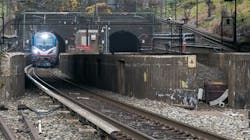How bad are delays caused by North River Tunnel and Portal Bridge? 2,000 lost hours bad.
Commuters who travel through the North River Tunnel or Portal Bridge experienced nearly 2,000 lost hours in extra transit time between 2014 and 2018 according to an analysis performed by Northeast Corridor (NEC) Commission staff. That’s more than 83 days and about the same time it takes to build a Boeing 777.
New Jersey Transit and Amtrak supplied five years’ worth of data that provided the foundation of the analysis. NEC Commission staff released its report during a meeting of the Gateway Program Development Corporation (GDC) Board of Trustees. The analysis found 85 days where failures in the 108-year-old tunnel and on the equally as old bridge caused more than five hours of delays for NJ Transit and Amtrak passengers.
“Regular delays are unacceptable for any amount of time, but these 85 major delay days are particularly bad, adding up to more than one day a month of major delays,” said GDC Board Chair and New Jersey Trustee Jerry Zaro. “Commuters are rightly frustrated at being forced to arrive very late to work and parents dismayed over lost time otherwise spent with family and children. It’s past time to build Gateway and give passengers the reliability they pay for and deserve.”
The Gateway Program has been dubbed the most urgent infrastructure program in America because it would rebuild and replace critical pieces of infrastructure on the busiest passenger rail line in the U.S.
“The North River Tunnel and the Portal Bridge might only represent a few miles of track, but they link 20 percent of the nation’s economy and carry 200,000 people per day. Incidents that start here ripple up and down the entire Northeast Corridor, particularly when they are causing five-hour delays and more. That’s why we’re working so hard to get Gateway funded and built,” said GDC Board Vice Chair and Amtrak Trustee Anthony R. Coscia.
“These major delay days caused by century-old infrastructure are too frequent, and riders have been forced to become too used to them,” said New York GDC Trustee Steven M. Cohen. “Building Gateway is the most effective way to make sure that these unacceptable delays stop.”
Amtrak and NJ Transit requested the analysis of the NEC Commission on behalf of the Gateway Program Development Corporation. The analysis involved examination of 3 million train movements and some 750,000 daily delay records compiled from Amtrak, NJ Transit and other Northeast Corridor operators. The findings focus on the 1.5 million train movements in the New York-New Jersey metropolitan area with additional analysis needed to quantify the ripple effect of these delays on services outside the local area.
The analysis was released on the same day that New York Gov. Andrew Cuomo and New Jersey Gov. Phil Murphy signed legislation into law that would establish the Gateway Development Commission, a bi-state entity that would oversee planning, funding and construction of new rail tunnels and other projects in the Gateway Program.
Other findings of the analysis include:
• The incidents on these 85 days alone accounted for 35 percent of all train delays and 43 percent of all delay minutes attributable to the North River Tunnel and Portal Bridge between 2014 and 2018;
• The rate of total delayed trains doubled from 11.8 percent on an average day to 22.6 percent on days where there were major incidents at either Portal Bridge or the North River Tunnel;
• There were 65 major infrastructure failure incident delay days involving the North River Tunnel and 18 related to mechanical failures of the Portal Bridge. Two days had combined Portal Bridge & North River Tunnel impacts;
• Most of the major incidents involving Portal Bridge failure occurred when the bridge would not close properly after being opened for marine traffic and testing, with some of the remaining incidents resulting from bridge fires;
• Even when the Portal Bridge is closed properly, regular openings of the bridge for marine traffic and testing resulted in over 1,000 delays on 230 days between 2014 and 2018; and
• Power transmission or catenary failures generated 35 percent of major delays at the North River Tunnel, while a full 65 percent were caused by other failures including signal problems or track conditions.

Mischa Wanek-Libman | Group Editorial Director
Mischa Wanek-Libman is director of communications with Transdev North America. She has more than 20 years of experience working in the transportation industry covering construction projects, engineering challenges, transit and rail operations and best practices.
Wanek-Libman has held top editorial positions at freight rail and public transportation business-to-business publications including as editor-in-chief and editorial director of Mass Transit from 2018-2024. She has been recognized for editorial excellence through her individual work, as well as for collaborative content.
She is an active member of the American Public Transportation Association's Marketing and Communications Committee and served 14 years as a Board Observer on the National Railroad Construction and Maintenance Association (NRC) Board of Directors.
She is a graduate of Drake University in Des Moines, Iowa, where she earned a Bachelor of Arts degree in Journalism and Mass Communication.


